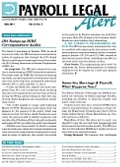Subscribe today to get:
- The nation’s premier newsletter for payroll professionals, filled with valuable tips and advice
- Unlimited access to PayrollLegalAlert.com
- Skill-building online training, plus valuable forms, tables, publications and the Payroll Compliance Handbook
- Links to other valuable resources you use every day … and much, much more!


